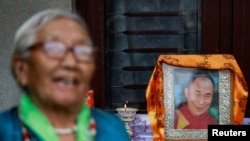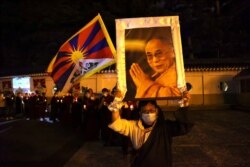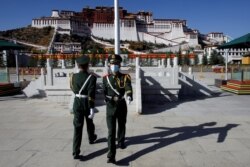On July 21, Chinese president and general secretary of the Chinese Communist Party (CCP) Xi Jinping made the first official presidential visit to Tibet in decades.
Chinese state media extensively covered the unannounced visit, repeatedly referring to the trip as an “inspection.”
Chinese state media noted the visit corresponded with what it called “the 70th anniversary of Tibet's peaceful liberation,” repeatedly asserting that the region has since seen social and economic improvements.
Ikenna Emewu, editor-in-chief of Africa China Economy Magazine in Nigeria, repeated many of those talking points in an opinion piece for the Chinese state outlet CGTN.
The op-ed, headlined “Xi's Tibet visit endorses Chinese pluralism, religious rights,” was meant to counter what it called “the overtly contorted tales about China's blanket aversion for religion.”
Emewu cited Xi’s visits to Tibetan Buddhist holy sites and interactions with Buddhist monks as “direct evidence to counter the claims that China's government opposes religion in all its dimensions.”
“This outing [of Xi] has become a major turnaround, signaling a truer picture of the leadership of China for a liberal stance in a plural society of multi-culture, religion and languages,” he wrote.
But characterizing Xi’s visit to Tibet and religious sites as a Communist Party endorsement of religious rights in the region presents a misleading and false impression.
Xi has intensified a decades-long crackdown on Tibetans’ religious freedoms.
The London-based rights group Amnesty International noted in its 2020 report on China that state repression in Tibet “remained severe.” People in Tibet, it reported, were “arbitrarily detained for ordinary religious practices that authorities deemed ‘signs of extremism’ under cover of so-called ‘De-extremification Regulations’.”
The New York-based group Human Rights Watch recently reported that 20 Tibetan monks from Tengdro monastery in Tingri county were detained. Some of them were beaten severely after members of their order were discovered to have communicated with and donated money to Tibetans in exile who’d been affected by the April 2015 earthquake in Nepal.
Four of the monks were sentenced to harsh jail sentences.
A 19-year-old Tibetan monk who was arrested in 2019 and rearrested the following year reportedly died in January from beatings and mistreatment in custody.
He had been detained along with six other monks, one as young as 16, for peacefully handing out leaflets and shouting slogans calling for Tibet’s independence. The monks were sentenced to up to five years in prison.
Earlier this month, as many as 30 Tibetans were reportedly arrested for celebrating the July 6 birthday of Tibet’s exiled spiritual leader, the Dalai Lama.
The Dalai Lama, 86, left Tibet during the 1959 Tibetan uprising against Chinese rule. China has insisted it will choose the Dalai Lama’s successor and has cracked down on those who possess photos of or post online about the spiritual leader.
A Tibetan shopkeeper received a five-year prison sentence for carrying a flag with a picture of the Dalai Lama on it.
Tibetan monasteries have been closed to outside visitors on the Dalai Lama’s birthday.
China has sought to control or appoint other Tibetan religious authorities, including the Panchen Lama, the second-highest religious authority in Tibetan Buddhism. The Dalai Lama selected Gedhun Choekyi Nyima as the 11th Panchen in 1995. Gedhun Choekyi Nyima, then just six years old, was taken away by Chinese authorities, never to resurface.
Gedhun Choekyi Nyima has been referred to as the world’s youngest political prisoner.
According to Radio Free Asia (a sister news agency to the Voice of America, which publishes Polygraph.info), Chinese authorities “have had difficulty persuading Tibetans to accept their Panchen Lama as the official face of Tibetan Buddhism in China.”
Many of the restrictions faced by Tibetans mirror those confronting Muslim minorities in China’s northwestern Xinjiang Uighur Autonomous Region.
A month before Xi became president in March 2013, authorities in Tibet announced they would expand the region's surveillance and monitoring system, focusing on “special groups,” including ex-prisoners and former exiles.
In 2011, Chen Quanguo, then Tibet's CCP party secretary, instituted a “grid-style social management” system that saw a massive ramp-up of policing and surveillance, including within monasteries.
In its International Religious Freedom report for 2015, the U.S. State Department, citing Chinese government figures, reported 7,000 government cadres had been dispatched to work at 1,787 monasteries during Chen’s tenure.
Access to and from religious sites was blocked and/or restricted, especially on sensitive dates like the anniversary of the failed 1959 Tibetan uprising and the Dalai Lama’s birthday.
Life, religious and otherwise, remains highly curtailed for Tibetans, with travel restrictions enforced both inside China and internationally, particularly on those seeking to go on religious pilgrimages to India, where the Dalai Lama and other prominent religious leaders live in exile.
Monks and nuns have also been subjected to “patriotic education” campaigns, in which they were forced to denounce the Dalai Lama and to study “materials praising the leadership of the CCP and the socialist system.”
The State Department report noted that these heightened restrictions served as the “impetus behind some of the self-immolations and protests.”
Radio Free Asia reported that from 2009 to January 2021, 157 Tibetans set themselves ablaze to protest Chinese rule.
In 2016, Chen was dispatched to Xinjiang, where he replicated his comprehensive system of social control.
In September 2020, Reuters reported that Tibetans were increasingly being pushed into military style training centers, mirroring allegations of ideological reeducation and forced labor in Xinjiang.
Polygraph.info and others have reported that religious persecution in China extends to many faith groups, with harassment, arrest, detention, torture, imprisonment and forced indoctrination employed against those who practice their faiths in defiance of myriad state restrictions.







